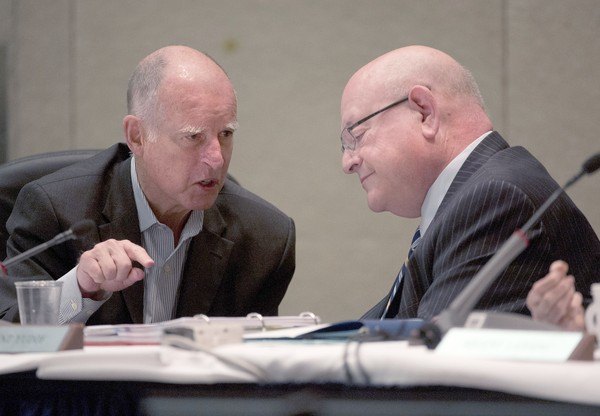UC retreats from broad graduate school tuition hikes

After proposing increases for about 14,000 graduate and professional school students, university officials now plan to hike fees for about 800 students, mainly in nursing.
By Larry Gordon
After previously proposing widespread and hefty tuition increases for graduate and professional degree programs, UC’s top administrators have retreated and will seek fee hikes affecting only a small group of graduate students, mainly in nursing, and at much reduced levels.
Only about 800 students in eight programs will be affected by a proposal expected to be approved by the UC regents later this month, officials said. Under a previous and now abandoned plan, about 14,000 graduate and professional school students in more than 50 programs such as law, medicine, social work and business faced tuition increases that met strong opposition from the governor and other officials in Sacramento.
In one of the most important changes, nursing students will probably face annual tuition hikes of $619, less than a quarter of the $2,700 they faced under the previous proposal. Nursing programs have lost some federal funding and must backfill with tuition, officials said.
“It’s a balancing act,” UC system spokeswoman Dianne Klein said of the much-reduced tuition proposal. The university needs enough money to maintain “top-notch programs to attract the best graduate students, but we also don’t want to alienate the people who make the decisions for state funding for the university.”
However, she warned that the tuition freeze for most graduate and professional school students may not last beyond the 2013-14 academic year. “This is not a long-term blueprint. This is the very minimum we believe we need to go another year. It’s not a sustainable model,” she added.
UC student regent Cinthia Flores described the change as “a step in the right direction” and said most graduate students will be pleased that the tuition freeze now will benefit not just undergraduates. “The UC system is finally starting to understand its commitment to higher education extends from the undergraduate level to the professional level,” said Flores, who is a UC Irvine law student.
For months now, it has been settled that undergraduate tuition at UC won’t increase next year. That will stay the same for the second year in a row, thanks in part to the tax hikes state voters approved last November.
Yet until now, much uncertainty surrounded tuition in some master’s and professional studies. The fate of those fees were among the final major decisions facing UC President Mark G. Yudof, who is leaving his post in late August.
In November, Yudof sought to raise 2013-14 fees for 56 professional and graduate degree programs, most by less than 10%. Those ranged from $144 more annually for a preventive veterinary medicine degree at UC Davis to a $3,256 increase for a business degree at UC Berkeley.
That proposal was put on hold after Gov. Jerry Brown said it was unseemly just days after voters approved Proposition 30, which boosts sales and some income taxes. Assembly Speaker John Pérez has been telling UC not to revive the idea, saying it would add too much student loan debt.
Graduate and professional degree students generally pay basic tuition of about $12,200. (Non-residents pay more.) In addition, about 14,000 of them are charged so-called professional degree supplemental tuition that ranges from $4,000 for a master’s in social welfare at UC Berkeley to $38,548 for a master’s degree in business at UC Berkeley, with a wide variety of costs for such fields as urban planning, dentistry, architecture, engineering, law and environmental science.
Despite student protests, the university over the last five years has imposed those supplemental fees on more programs, widening the scope from the traditional categories of law, medicine and dentistry to fields that often lead to less lucrative careers, such as public health, art, education and social work. (Students in more purely academic studies such as doctorates in English or chemistry did not face those supplemental charges.)
The UC regents are expected to approve Yudof’s new proposal, which includes financial aid for needy graduate students, at a meeting July 16-18 in San Francisco. Under the plan, supplemental tuition would be increased only at nursing programs at the UCLA, Davis, Irvine and San Francisco campuses.
In addition, according to Klein, the supplemental fees would affect four new master’s programs: $28,900 for UC Santa Cruz studies in games and playable media; $23,000 for UC Santa Cruz’s technology and information management; $10,400 for UC Davis’ health services and physician assistant studies; and $30,330 in a joint UC Berkeley-UC San Francisco program in translational medicine, which will train students to bring new inventions to patient care.
Yudof recently approved a plan for the full-time business master’s degree program at UCLA’s Anderson School of Management that will rely wholly on tuition and donations rather than state funding. He is expected to approve a tuition hike for those students without needing a vote of the regents.
[Source]: LA Times


